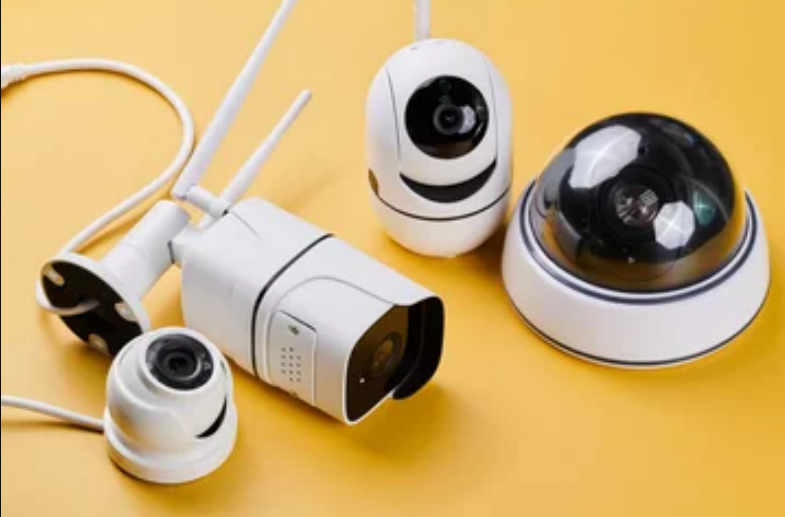Crimes are rising, and according to the Federal Bureau of Investigation, 3,300 burglaries happen daily in the United States alone. Because of this, security (adopting the types of CCTV cameras) has become a significant concern for everybody. However, a recent SafeWise study revealed that only 25% of homeowners have a security system installed. Budget and privacy issues are the two main reasons for this.
This part is where CCTV (Closed-Circuit Television) cameras come into play. This technology is increasingly becoming popular due to its ability to deter, detect, and document criminal activities. Otherwise known as security cameras, these devices help reduce crime by as much as 47.4%.
Aside from its ability to help protect your premises, a CCTV system also offers a variety of features and benefits. This is why surveillance cameras installed grew to 50% in 2018 and continue to increase as the years go by.
11 Types Of CCTV Cameras: Know The Purpose
Technology has advanced, and so have CCTV cameras. Many CCTV camera types and models are now available, offering plenty of features for different applications. Below are some of the most popular options today.
1) HD CCTV Cameras
Indulge in a visual delight with High-Definition CCTV cameras, a must-have for security enthusiasts. Operating flawlessly even in low-light conditions, they excel at capturing intricate details with remarkable precision. Experience unparalleled clarity in your footage, facilitating seamless monitoring and precise identification, whether in a bustling commercial hub or a serene residential retreat.
These HD CCTV cameras provide 4K UHD clarity, continuous recording, motion detection, WDR, and sensor technologies. Modern technologies for accurate surveillance in any setting will up your security game. Learn more about the cameras that shine brightest when tasked with meticulous endeavors like license plate reading and facial recognition. Witness security innovation as HD cameras redefine vigilance, providing a clear advantage in any setting.
2) Dome CCTV Cameras
Dome cameras are so-called because they are shaped like a dome—a shape that deters vandalism. This security camera provides a broad view with a 360-degree range of motion.
One key feature of the dome CCTV camera lies in the nature of its design. The dome shape makes it confusing for criminals to determine the direction. As a result, anyone trying to break in or cause any damage will be more likely to give up. This is why it’s a popular choice for retail and commercial establishments.
A dome camera is also easy to install because it only needs to be mounted on a wall or ceiling. Thus, it can be done with minimal disruption to the property.
3) Bullet Cameras
A bullet camera is a typical outdoor security camera. It has a cylindrical shape and is designed to withstand harsh weather conditions. Most bullet cameras are also equipped with infrared night vision lenses. This feature allows the device to record even in very low light conditions.
Custom-made for outdoor use, bullet cameras boast a long range of motion and have an incredibly narrow field of view. This makes them perfect for monitoring large areas like parking lots, driveways, and gardens.
However, because it has an arm-like shape that can be easily spotted, bullet cameras are less preferred in locations where discretion is needed. It also requires regular maintenance as the camera joints loosen due to constant movement.
4) C-mount Cameras
The c-mount camera is another type of CCTV camera often used by professionals. This security camera can be easily mounted to a wall or ceiling and is connected to an external lens. It also has a wide range of views, making it suitable for large spaces.
One notable feature of the C-mount camera is its ability to capture images in extreme lighting conditions. This makes it perfect for outdoor applications such as surveillance of parks, open spaces, and industrial complexes.
On the downside, c-mount cameras are bulky and expensive due to their advanced features. This makes them less ideal for residential use as they can be too costly for many people.
5) PTZ Cameras
PTZ stands for Pan, Tilt, and Zoom and is one of the most advanced types of high-definition CCTV cameras. It has a motorized mechanism that lets it move horizontally (pan) and vertically (tilt). It also has a zoom feature, allowing it to capture far-away details.
This type of camera is usually used for live surveillance because it lets the operator control the camera remotely. The PTZ camera is also very versatile and can be helpful in many security scenarios. It can also be used for tracking intruders, as it can follow a person or an object. The main drawback of the PTZ camera is its price. It can be quite expensive and unsuitable for those with a limited budget.
6) Digital CCTV Cameras
These cameras reject analog signals in favor of digital transmission, embracing the digital revolution. This change guarantees flawless image quality that is resistant to signal deterioration at long distances. Digital CCTV camera models include improved data encryption to prevent hacking and unauthorized access. Due to their network protocol compatibility, consumers can access their properties remotely and monitor them in real time using laptops or cell phones.
7) Day/Night Cameras
With their extra sensitive imaging chips, day/night cameras can switch from color to black and white mode when the light starts to fade. This helps provide better visibility in low-light conditions. The day/night camera is also a great choice for outdoor surveillance since it has a higher resolution than other CCTV cameras. It can capture more details even in total darkness, making it an excellent option for nighttime surveillance.
The only downside of the day/night camera is residential users may find it too complicated to set up and use. That means it might not be the best choice for people who only prefer basic security features.
8) Thermal/ Infrared Technology Cameras
Thermal or infrared technology cameras are the best choice for monitoring areas with limited visibility. This camera uses infrared light to detect objects even in complete darkness. It creates an image based on the object’s heat signature, allowing it to see in the dark. Thermal cameras are also great for large-scale security as they cover a wide area. They can detect objects from long distances and generate clear images even in low-light conditions.
However, this type of camera can be costly and require professional installation. Furthermore, it can only detect heat signatures—not color or details, so it is not the best choice for facial identification.
9) Wired and Wireless CCTV Cameras
Wireless CCTV cameras are gaining popularity due to their easy installation and portability. They can be set up anywhere without wires, making them a better option than traditional systems. Likewise, they also have longer battery life and can be used even in remote locations. They also offer more flexibility regarding placement as they are easier to move around. Whereas wired cameras come with a wire that needs to be plugged into a power source for continuous operation.
Unfortunately, some popular wired and wireless camera systems may be vulnerable to interference from other devices. This means that the signal could be disrupted, resulting in blurred images or delays in transmission. They have a limited range and may need to be closer together for wider coverage. However, these challenges can be mitigated with the right setup and proper placement.
10) Network/IP Cameras
IP CCTV cameras have network video recorders that make them some of the most advanced options in the market. This type of CCTV camera is connected to an Ethernet network, allowing it to be accessed from any device. This makes it an ideal selection for those who seek absolute authority over their home security system. Furthermore, you can have remote access and view your property in real time from anywhere worldwide!

Although IP cameras provide higher resolution and better performance, they are expensive and require a powerful network connection. Furthermore, the images can be viewed and tampered with by anyone on the network. So, security measures must be taken to ensure the data’s safety.
11) Discreet CCTV Cameras
This type of CCTV camera is designed to blend in and stay hidden. Discreet cameras are often used in locations where having a visible security system can be a disadvantage. They can be disguised as everyday objects, making them very difficult to spot.
Discreet cameras are also great for covert surveillance as they can capture images without anyone noticing. However, they have a limited field of view and may not be suitable for large spaces. Furthermore, they can be easily blocked or knocked out of place, making them less reliable. You need the right placement and setup to get the most out of this type of camera.
Factors To Consider When Choosing CCTV Cameras
You must look into several factors when choosing a CCTV camera. These include the following:
Image Resolution
Comparing CCTV vs. smartphone camera quality makes it easy to see why resolution matters so much. It is the number of pixels or details the camera can capture. The higher the resolution, the more detailed images you’ll get. This is crucial when you need to identify people or objects.
Camera Size and Shape
Be sure to choose a size and shape that will blend in with your property. This helps deter intruders and prevent vandalism. Many make the mistake of choosing a camera that stands out too much, which can be a significant security risk.
Budget
You’ll also need to set a budget for your security system. High-end cameras can be costly, so it’s best to consider those within your price range. Many affordable cameras for filmmaking can be found with features that are good enough for home security. So, take the time to compare different models and choose one that fits your needs.
Accessibility
Remote viewing is now a standard feature for modern security cameras. It allows you to access footage from any device with an internet connection. Ensure your chosen device has this feature, which can be beneficial when monitoring your property.
How To Install CCTV Cameras?
Installing CCTV cameras is not as complicated as it seems. But before getting started, you should plan your system’s setup and ensure you have all the necessary components.
Once everything is ready, you can start mounting the cameras to a wall or ceiling. Afterward, plug the device in and get your recording setup ready. Finally, link your system to an internet connection so you can view your footage remotely.
Installing a CCTV camera can be done in just a few simple steps. But for larger or more complex systems, hiring professionals who can do the job safely and properly is best.
Frequently Asked Questions About CCTV Cameras
1) Is it safe to use a CCTV camera?
Unlike other security systems, CCTV cameras are non-intrusive and do not require any contact with people. As long as you comply with the laws in your area, you can use CCTV cameras without any problems.
Another safety concern about CCTVs is the possibility of hackers accessing your data. Previous reports have shown that some CCTV cameras were hacked and used to spy on people. Use a secure network connection and change your passwords regularly to protect yourself from such attacks. Moreover, today’s CCTV cameras have data encryption, making them even more secure. Hacking or tampering with your data is almost impossible.
2) Are CCTV cameras equipped with NVR technology?
Yes, Network Video Recorders (NVRs) are integral to modern CCTV systems. They allow users to store, access, and manage their footage remotely. With NVRs, users can control multiple video streams in real time and access them from any device with an internet connection.
NVRs also support high-resolution recordings, motion detection, and face recognition features. This makes them even more useful for businesses or homes that need more sophisticated security solutions.
3) How long does a CCTV work?
A CCTV camera can last up to five years with proper maintenance. However, this lifetime varies depending on the type. For instance, a dome camera may last up to 10 years, while a c-mount camera can only operate for three to five years.
To prolong the life of your CCTV camera, it’s best to perform regular maintenance and clean the lens regularly. In this manner, you can rest assured that you’re receiving the highest value for your money.
4) Which is the best CCTV camera for a home?
The dome camera is the most popular for residential use among the many security camera types. It’s discreet, easy to install, and provides a broad view. It also has an anti-vandalism design, making it an ideal home choice.
If you need more sophisticated security features such as motion detection and facial recognition, you may want an IP camera. They are more expensive but provide better security performance.
Ultimately, the best camera for your home will depend on your budget, security needs, and personal preferences.
Final Verdict
In conclusion, CCTV cameras are essential tools for security and surveillance. They come in various types, each with its advantages and drawbacks. Consider all the factors mentioned above and do your research to find the best camera for your needs. With the right camera, you can have peace of mind knowing that your property is safe and secure. Doing so will ensure you get the most out of your CCTV camera.





